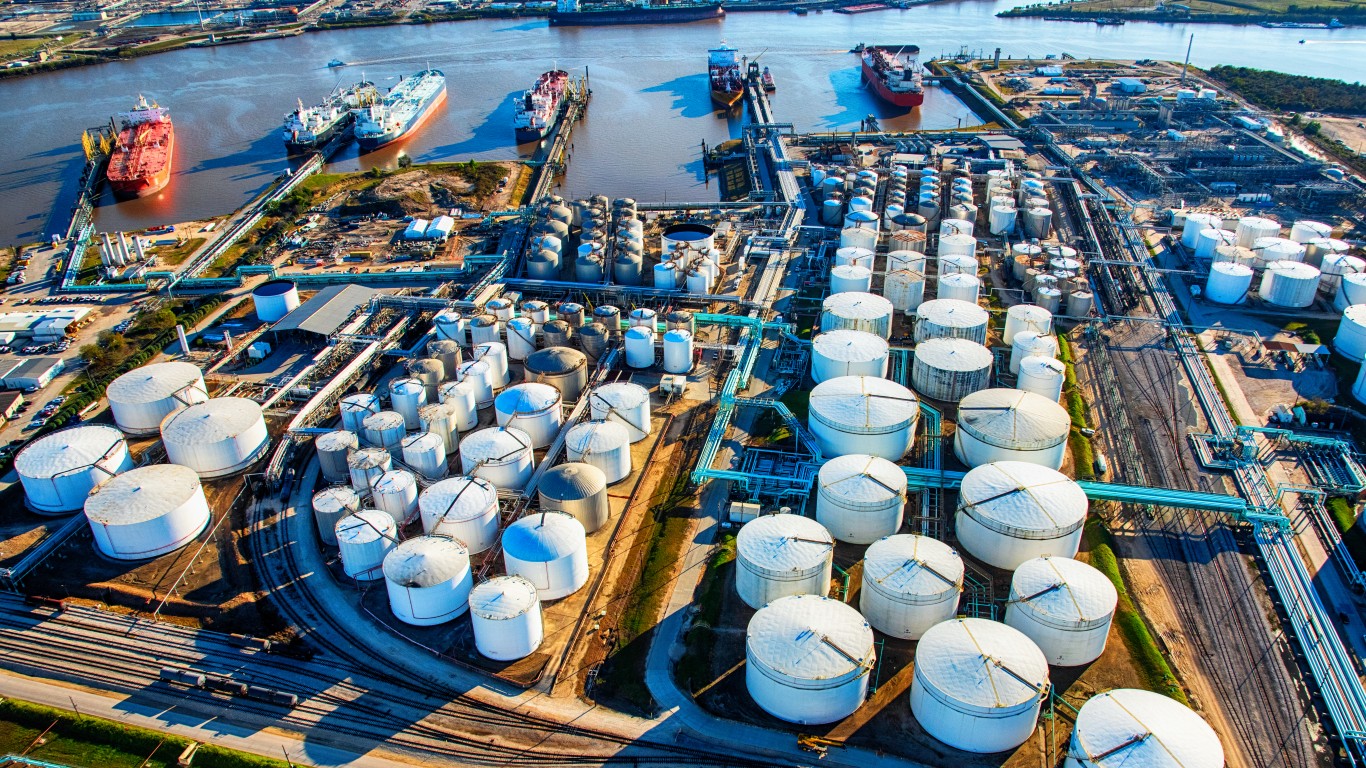

In what was a very surprising move as Americans celebrated the Labor Day holiday, the Organization of the Petroleum Exporting Countries (OPEC) cut oil production by 100,000 barrels a day, despite some stiff resistance from Russia. The energy ministers of the member nations agreed to return production levels to the original August quotas, saying that the increase last month was only for September. Though the U.S. stocks markets were closed Monday, the oil markets were not, and both Brent and West Texas Intermediate crude closed 3% higher.
[in-text-ad]
Despite the Monday gains and Tuesday’s mixed close, Brent still trades well under the $100 level, while West Texas Intermediate was below $90 a barrel. That is a far cry from the $130 intraday highs hit back in March. What makes sense for investors now is to grab the big-divided energy giants that are on sale. They all are trading well below their 52-week highs hit earlier this year.
We screened our 24/7 Wall St. energy research database looking for large-cap energy leaders that paid substantial and dependable dividends and that are Buy rated at top Wall Street firms. Seven stocks made the grade. However, it is important to remember that no single analyst report should be used as the sole basis for any buying or selling decision.
BP
This is one of the premier European integrated oil giants, and Goldman Sachs analysts are quite positive on the shares. BP PLC (NYSE: BP) engages in the energy business worldwide. It produces and trades in natural gas; offers biofuels; operates onshore and offshore wind power and solar power generating facilities; and provides de-carbonization solutions and services, such as hydrogen and carbon capture, usage and storage.
The company is also involved in the convenience and mobility business, which manages the sale of fuels to wholesale and retail customers, convenience products, aviation fuels, and Castrol lubricants. It is involved in refining, supply and trading of oil products, as well as operation of electric vehicle charging facilities. In addition, it produces and refines oil and gas, and it invests in upstream, downstream and alternative energy companies, as well as in advanced mobility, bio and low carbon products, carbon management, digital transformation and power and storage areas.
Shareholders receive a 4.36% yield. The Goldman Sachs price target for the domestic shares of BP stock is $45. That compares with a $37.14 consensus target and Tuesday’s closing share price of $31.13.
Chevron
This integrated giant is a safer way for investors looking to get positioned in the energy sector. Chevron Corp. (NYSE: CVX) engages in integrated energy and chemicals operations worldwide.
Chevron’s Upstream segment is involved in the exploration, development, production and transportation of crude oil and natural gas; processing, liquefaction, transportation and regasification associated with liquefied natural gas (LNG); transportation of crude oil through pipelines; and transportation, storage and marketing of natural gas, as well as operating a gas-to-liquids plant.
[in-text-ad]
The Downstream segment engages in refining crude oil into petroleum products; marketing crude oil, refined products and lubricants; manufacturing and marketing of renewable fuels; transporting crude oil and refined products by pipeline, marine vessel, motor equipment and rail car; and manufacturing and marketing of commodity petrochemicals, plastics for industrial uses, and fuel and lubricant additives. It is also involved in cash management and debt financing activities, insurance operations, real estate activities and technology businesses.
Chevron stock comes with a 3.60% dividend. Wells Fargo’s $185 target price is well above the $178.07 consensus target and Tuesday’s close at $157.12.
Devon Energy
This may be one of the best value propositions in its sector, as it uses a variable dividend strategy. Devon Energy Corp. (NYSE: DVN) is an independent energy company that primarily engages in the exploration, development and production of oil, natural gas and natural gas liquids (NGLs) in the United States and Canada. It operates approximately 19,000 wells.
The company also offers midstream energy services, including gathering, transmission, processing, fractionation and marketing to producers of natural gas, NGLs, crude oil and condensate through its natural gas pipelines, plants and treatment facilities.
Production is weighted toward crude oil while growth opportunities are liquids focused, anchored by the Delaware Basin, SCOOP/STACK, Eagle Ford Shale, Canadian Oil Sands, and the Barnett. Devon also owns equity in the publicly traded midstream MLP EnLink.
Shareholders receive an 8.78% dividend. Truist Financial has a $115 target price. The consensus target for Devon Energy stock is $78.71, and shares closed at $69.54 on Tuesday.
Enterprise Products Partners
This is the largest publicly traded energy partnership and a leading North American provider of midstream energy services to producers and consumers. Enterprise Products Partners L.P. (NYSE: EPD) provides a wide variety of midstream energy services, including gathering, processing, transportation and storage of natural gas, NGL fractionation, import and export terminaling, and offshore production platform services.
One reason many analysts may have a liking for Enterprise Products Partners stock might be its distribution coverage ratio. This ratio is well above 1 times, making it relatively less risky among the MLPs.
Investors receive a 7.22% distribution. The $33 UBS price target compares with a consensus price target of $31.47. Enterprise Products Partners stock closed on Tuesday at $26.25.
[in-text-ad]
Exxon Mobil
Despite the huge rally in oil this year, this mega-cap energy leader trades at levels printed in 2015 and still offers investors an excellent entry point. Exxon Mobil Corp. (NYSE: XOM) is the world’s largest international integrated oil and gas company. It explores for and produces crude oil and natural gas in the United States, Canada, South America, Europe, Africa and elsewhere.
Exxon also manufactures and markets commodity petrochemicals, including olefins, aromatics, polyethylene and polypropylene plastics, and specialty products, and it transports and sells crude oil, natural gas and petroleum products.
Top Wall Street analysts expect Exxon to remain a key beneficiary in this higher oil price environment, and most remain strongly positive about the company’s sharp positive inflection in capital allocation strategy, upstream portfolio, and leverage to a further demand recovery, with Exxon Mobil offering greater downstream/chemicals exposure relative to peers.
Exxon Mobil stock investors receive a 3.68% dividend, which will continue to be defended. BofA Securities has set a $120 price target. The consensus target is lower at $103.63. Tuesday’s close was at $94.95 a share.
Hess Midstream
This is the limited partnership midstream arm of one of the country’s top energy companies. Hess Midstream L.P. (NYSE: HESM) owns, develops, operates and acquires midstream assets. The company operates through three segments.
The Gathering segment owns natural gas gathering and crude oil gathering systems, as well as produced water gathering and disposal facilities. Its gathering system consists of approximately 1,350 miles of high and low pressure natural gas and natural gas liquids gathering pipelines with capacity of approximately 450 million cubic feet per day, and the crude oil gathering system comprises approximately 550 miles of crude oil gathering pipelines.
The Processing and Storage segment comprises Tioga Gas Plant, a natural gas processing and fractionation plant located in Tioga, North Dakota; a 50% interest in the Little Missouri 4 gas processing plant located in south of the Missouri River in McKenzie County, North Dakota; and Mentor Storage Terminal, a propane storage cavern and rail, and truck loading and unloading facility located in Mentor, Minnesota.
[in-text-ad]
The Terminaling and Export segment owns Ramberg terminal facility; Tioga rail terminal; and crude oil rail cars, as well as Johnson’s Corner Header System, a crude oil pipeline header system.
Investors receive a 7.46% distribution. Hess Midstream stock has a $40 price target at Goldman Sachs. The consensus target is $34.60, and the stock closed at $28.37 on Tuesday.
Phillips 66
This extremely diversified energy company has a long and successful operating history, and it is a longtime Goldman Sachs Conviction List member. Phillips 66 (NYSE: PSX) operates through four segments: Midstream, Chemicals, Refining, and Marketing and Specialties. The company holds many of these assets within its MLP, Phillips 66 Partners.
The company benefits from the tax-advantaged structure while still operating a more diversified operating business that also contains many assets that are not ideal MLP assets, such as its fast-growing chemical manufacturing business and its super-profitable refined products marketing business.
Phillips 66 is the top idea within refining coverage at Goldman Sachs, which continues to see headroom for incremental capital returns this year. The analysts are constructive on a positive rate of change at Refining in 2022. In addition, they continue to see attractive non-refining value in the other segments.
The dividend yield is 4.39%. The Goldman Sachs price target of $109 is less than the $112.99 consensus target, but Phillips 66 stock ended Tuesday trading at $86.70.
All these dividend energy stocks have backed up nicely, and in a world where interest rates are stagnant despite Federal Reserve increases (and plans to continue), they offer dependable income, a degree of safety and some of the best entry points in months. Plus, with three integrated giants, two top energy MLPs, an exploration and production favorite and a top refining leader, investors have plenty to choose from to add to or initiate energy positions.
Essential Tips for Investing: Sponsored
A financial advisor can help you understand the advantages and disadvantages of investment properties. Finding a qualified financial advisor doesn’t have to be hard. SmartAsset’s free tool matches you with up to three financial advisors who serve your area, and you can interview your advisor matches at no cost to decide which one is right for you. If you’re ready to find an advisor who can help you achieve your financial goals, get started now.
Investing in real estate can diversify your portfolio. But expanding your horizons may add additional costs. If you’re an investor looking to minimize expenses, consider checking out online brokerages. They often offer low investment fees, helping you maximize your profit.
Thank you for reading! Have some feedback for us?
Contact the 24/7 Wall St. editorial team.
 24/7 Wall St.
24/7 Wall St. 24/7 Wall St.
24/7 Wall St.


